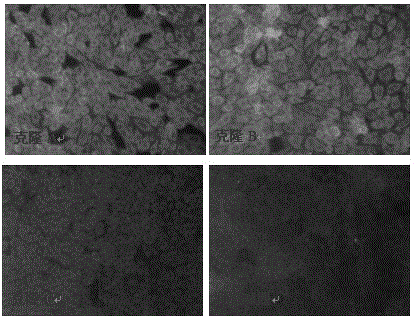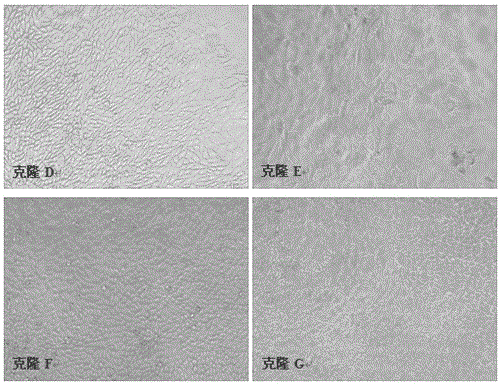A method for screening virus-sensitive cell clones using indirect immunofluorescence detection technology
A technology for immunofluorescence detection and virus-sensitive cells, which is applied in the biological field, can solve the problems of long cycle, high cost, and complicated operation, and achieve the effect of strong repeatability, short detection time, and simple operation
- Summary
- Abstract
- Description
- Claims
- Application Information
AI Technical Summary
Problems solved by technology
Method used
Image
Examples
Embodiment Construction
[0043] The present invention will be further described below in conjunction with the accompanying drawings and specific embodiments, so that those skilled in the art can better understand the present invention, but the present invention is not limited thereby.
[0044] (1) Identification of cell line purity:
[0045] Recovery culture of ST cells: Culture ST cells recovered from liquid nitrogen in a square bottle. The culture conditions include: pH 7.2, temperature 37°C, medium MEM containing 8% serum for swine fever; culture time 72h, cell single Layer length to 100%;
[0046] Subculture of ST cells: Digest and disperse the monolayer of ST cells with EDTA-trypsin to obtain a cell suspension, which is divided into square flasks according to the culture area ratio of 1:3;
[0047] Inoculation of cells: attenuated hog fever rabbit virus (preserved by the China Veterinary Drug Administration, preservation number AV1412) stored at -80°C (poison price 10 3.0 TCID 50 / 0.1mL) in wa...
PUM
 Login to View More
Login to View More Abstract
Description
Claims
Application Information
 Login to View More
Login to View More - R&D
- Intellectual Property
- Life Sciences
- Materials
- Tech Scout
- Unparalleled Data Quality
- Higher Quality Content
- 60% Fewer Hallucinations
Browse by: Latest US Patents, China's latest patents, Technical Efficacy Thesaurus, Application Domain, Technology Topic, Popular Technical Reports.
© 2025 PatSnap. All rights reserved.Legal|Privacy policy|Modern Slavery Act Transparency Statement|Sitemap|About US| Contact US: help@patsnap.com



